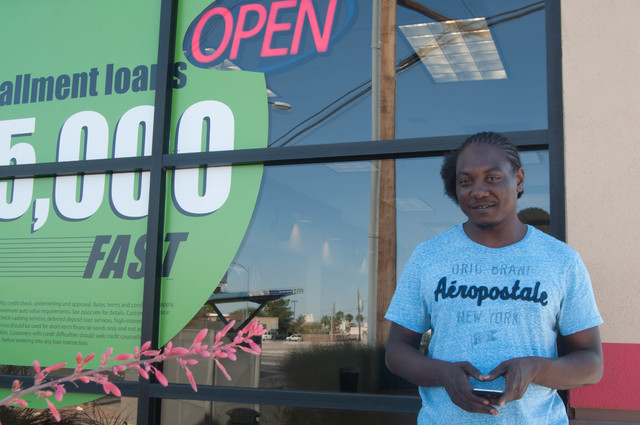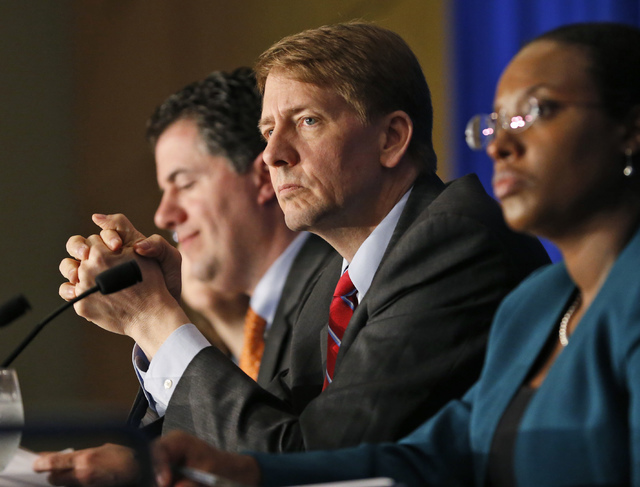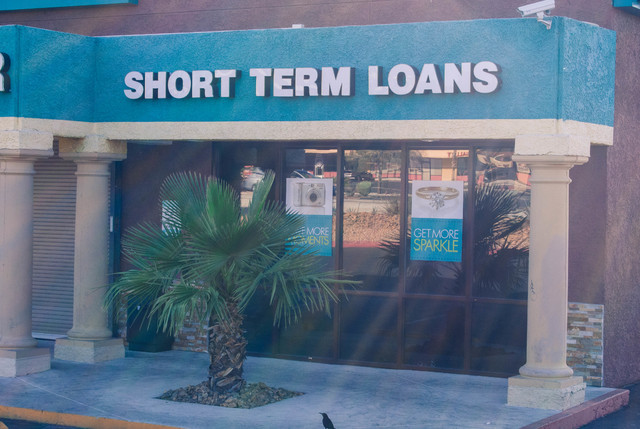Some say payday loans occupy needed niche; proposed reform could have fallout
(This is the second story in a series about the payday loan industry in Las Vegas.)
Las Vegas has plenty of flashing neon signs, but not all of them are for entertainment purposes — some signal hope for those who partake in a $50 billion-a-year nationwide industry.
Instead of flashing “girls, girls, girls,” these signs flash “fast cash.”
Payday loans are controversial because they take the form of small, short-term cash advances at high interest rates. Industry reform advocates say they are a predatory business despite helping roughly 12 million mostly lower-income people per year.
“A large group of people in the economy can’t qualify for traditional lending,” said Dr. Stephen Miller, director of the Center for Business and Economic Research at UNLV. “Most of the borrowers are living from paycheck to paycheck and don’t have many options in terms of borrowing.”
Who are payday loan borrowers?
Payday loan borrowers spend roughly $7.4 billion annually at 20,000 storefronts and hundreds of websites, plus additional sums at a growing number of banks, according to a 2012 Pew Study titled “Who Borrows, Where They Borrow, and Why?” The study noted that most payday loan borrowers are white, female and between 25 and 44.
There are five groups that have higher odds of having used a payday loan: those without a four-year college degree; home renters; blacks; those earning below $40,000 annually; and those who are separated or divorced, according to the study.
In addition, the study found that 69 percent of payday borrowers use loans to cover a recurring expense, such as utilities, credit card bills, rent/mortgage or food, and 16 percent needed it to deal with an unexpected expense, such as a car repair or medical emergency.
Las Vegas resident Patrick Lombardo, 25, has used payday loans four times in the past 1½ years to pay for rent or utility bills while working part time and going to school full time at the College of Southern Nevada.
Because Lombardo dropped out of high school, he said he didn’t qualify for grants, which made paying for independent living and tuition difficult when he was working as an on-call security guard.
“I had no other options,” he said. “My parents are both retired and barely have extra money. I don’t have a vehicle in my name for a title loan, and I don’t own a home, so I have nothing to borrow. Since I’m a college student, I also have poor credit. This is a bad industry in terms of it being predatory, but on the other hand, it’s a necessary evil for people like me who have nowhere to go.”
Jamie Fulmer, a spokesman for Advance America — one of the biggest payday lenders in the United States — said his clientele are reflective of the hard-working, middle-class Americans who cannot come up with $200 in an emergency.
“They all have jobs and bank accounts, but for whatever reason, they have dire financial needs,” Fulmer said. “The advantage of having payday loan stores is that consumers are provided with the ability to access safe, reliable and regulated forms of credit when they need it most.”
Other clients include those like Robert Sherrill, 33, who started a commercial cleaning business called Imperial Cleaning Systems Inc. in his hometown of Nashville, Tenn.
Sherrill grew up in public housing and spent five years in federal prison for selling drugs.
“No one wants to give you a job when you’re a felon,” he said. “Not a lot of people would give people like me a chance at the American Dream because they think we’re of no use to society, but Advance Financial gave me that chance to start my business. Now I’m doing half a million dollars a year.”
Sherrill now employees 20 people — most of them ex-offenders.
“Speaking from experience, I’d say crime will go up if payday loan stores are banned because if you’re not giving me any options, then I’m going to do what comes natural and that is to survive,” Sherrill said. “If I have to rob or steal, then I will because I need to make sure my kids are fed and the bills are paid.”
Payday lenders: legal loan sharks or saviors?
With news that the Consumer Financial Protection Bureau — the watchdog agency set up by the federal government after the Great Recession — was set to adopt strict new national rules regarding payday lending, many worry about potential consequences for people who need the loans. If enforced, the rules will limit the number of loans that can be taken out in quick succession and will force companies to check that their borrowers have the means to repay them.
Fulmer believes that this could have a serious consequence on the people whom the bureau is supposed to protect.
“Something that the bureau hasn’t done is talked to customers to understand why they use these services and what their options would be if they didn’t have these types of loans,” Fulmer said. “First and foremost, the biggest winners (if the regulation were to go through) would be illegal operators. With less regulation, there would be more risks, and it would become more expensive to the consumer. Consumers would have to pay the penalty for late bills, pay a reconnect fee if they can’t pay the utility bill on time or be forced to bounce checks and face those fees, which would incur higher overdraft fees.”
Fulmer is also concerned that these potential new rules would drastically reduce business. The bureau has estimated that payday lenders would see a revenue decline between 59 and 84 percent.
“I don’t know of any type of business that could sustain itself with that type of impact,” Fulmer said. “This is simply not reflective of the needs and wants of consumers.”
The problem being, he said, that when short-term loans disappear, the demand for them does not, so instead customers are forced to seek other more expensive forms of credit, such as pawn shops, or paying late fees on overdue bills.
Miller believes that low-income consumers would suffer the most.
“The payday loan industry is meeting a niche in the credit market,” Miller said. “People who don’t use that niche might not necessarily see it as a good thing, but it is needed in the community. The problem is that it is associated with sucking people into a cycle of debt. However, if this market were to be banned, people would have to find another source. Since most couldn’t qualify for bank loans, I suspect many would turn to the underground market or lose their properties and become homeless.”
According to research from The Pew Charitable Trusts, borrowing $300 for two weeks typically costs $60 in interest in Nevada — a 521 percent annual interest rate.
Yet despite the high interest rate, Fulmer said because payday loans are so small and average about $375, high interest fees are needed to make it a profitable industry.
In Georgia and North Carolina — states where payday loans are banned — a 2007 report by the Federal Reserve Bank of New York found that residents paid more bounced-check overdraft fees and became more likely to file for bankruptcy.
Do borrowers have a good sense of the product they are buying or are they really unsuspecting victims?
Perhaps not everyone takes the time to read the small print, but a George Washington University School of Business survey found that 89 percent of payday loan consumers are “very satisfied” or “somewhat satisfied” with their last loan, and 86 percent see payday loans as a useful service.
In order to take out a payday loan, people need to have a job and a bank account. Sherrill argues that perhaps what is needed is better pay to ensure people don’t feel like they are at the end of their rope.
“We’re at-risk people,” Sherrill said. “It’s kind of like a mortgage. You take out a loan for a house, and in 30 years, you end up paying double what it’s worth. Every system has it everywhere you look. The reality is that the payday loan industry is helping people in poverty. Instead of attacking them, what we need are second chances, and payday loan stores provide that.”
Editor’s note: The story should have noted that Robert Sherrill’s company earned 80 percent of its revenue in 2015 from cleaning payday lender Advance Financial’s 57 offices. In January 2015, Nashville PRIDE newspaper wrote, “Advance Financial will also be forced to stop doing business with many black contractors, one of which is Robert Sherrill, owner of Imperial Cleaning Services. Imperial currently cleans 57 stores for Advance Financial. ‘I have six employees and 80 percent of my business is Advance,’ ” said Sherrill. ‘I can’t clean the stores during the day time, so I come during those wee hours of the morning. Holleman is trying to cripple me.’ ”
To reach North View reporter Sandy Lopez, email slopez@viewnews.com or call 702-383-4686. Find her on Twitter: @JournalismSandy.
Consumer Financial Protection Bureau
Visit consumerfinance.gov.
























